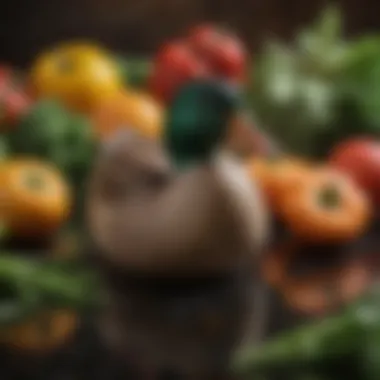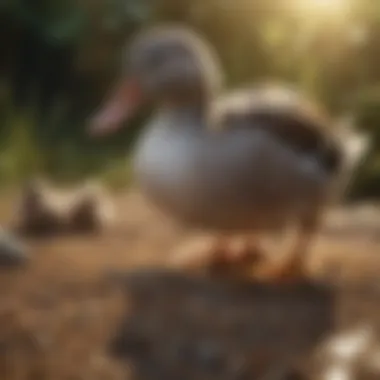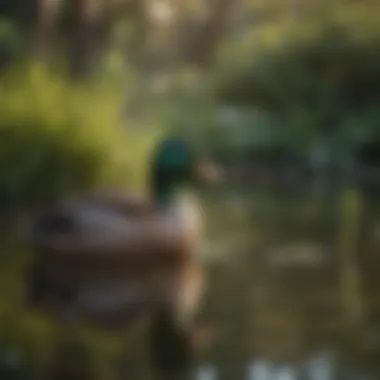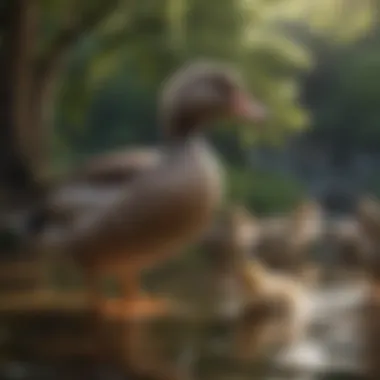Essential Diet Guide for Pet Ducks: What They Eat


Intro
Ducks can make delightful pets, requiring attention not only in care but also in their dietary needs. Understanding what ducks eat is key to their health and happiness. A proper diet influences their growth, reproduction, and overall well-being. This guide aims to deepen awareness among current and prospective duck owners about the nutritional requirements of pet ducks.
Nutritional Needs of Pet Ducks
Ducks, like all pets, possess unique dietary requirements. A balanced diet includes a variety of foods. Waterfowl thrive on grains, vegetables, and protein sources. Different duck breeds may have slightly different food preferences, but all require adequate nutrients.
Key nutrients include:
- Carbohydrates: Provide energy.
- Proteins: Essential for growth and repair.
- Vitamins and Minerals: Maintaining immune function and bone health.
- Fiber: Important for digestion.
Feeding guidelines often suggest a mix of commercial duck feeds, vegetables, and grains. It is important to avoid stale or spoiled food, which poses health risks.
Suitable Food Options
Choosing the right food is fundamental for pet ducks. Here are some recommendations:
- Commercial Duck Feed: Specifically formulated to meet the nutrient needs.
- Grains: Such as oats, barley, and corn can be fed in moderation.
- Vegetables: Leafy greens like spinach, kale, and lettuce are beneficial.
- Fruits: Offered sparingly, fruits like berries and apples (without seeds) can be a treat.
Always provide fresh water. This is vital for proper hydration and overall health.
Implications of Improper Feeding
Feeding ducks incorrectly can lead to health complications. A diet low in essential nutrients may cause:
- Obesity: Resulting from lack of exercise and overeating.
- Underdevelopment: Insufficient nutrients can stunt growth in young ducks.
- Digestive Issues: Poor dietary fiber can lead to problems like swelling or blockage.
"A balanced diet is not just about satisfaction. It is at the core of a duck's health and longevity."
Understanding these factors enables owners to avoid common feeding mistakes.
Epilogue
Providing the correct food for pet ducks is crucial for their health and happiness. Emphasizing a balanced diet, appropriate food sources, and avoiding common errors contributes significantly to their well-being. This guide serves to empower duck owners with knowledge, ensuring they can provide the best care possible.
Understanding the Basics of Duck Diet
Understanding the diet of pet ducks is crucial for their overall health and well-being. Ducks, like all animals, have specific nutritional needs that must be carefully considered. Providing the right balance of food ensures that they receive essential vitamins, minerals, and nutrients that foster their growth and maintain their health. A well-informed approach to feeding pet ducks can lead to better egg production, a stronger immune system, and a longer lifespan.
When assessing the dietary requirements of ducks, various elements come into play. These include their age, activity level, and even the environment in which they are kept. Additionally, pet owners must be aware of the limitations of their own knowledge regarding what constitutes appropriate duck feed.
Proper feeding practices contribute greatly to the vitality of pet ducks. Owners need to understand not just what to feed, but also how often and in what quantities. This knowledge can significantly impact the physical and behavioral aspects of duck care, reducing the chances of feeding-related health issues.
Nutritional Needs of Ducks
Ducks require a balanced diet that supports their unique physiology. Their nutritional needs can generally be broken down into several categories:
- Carbohydrates: Ducks get energy primarily from carbohydrates found in grains and seeds.
- Proteins: Essential for growth and feather development, proteins can be sourced from insects and specially formulated feeds.
- Vitamins and Minerals: Ducks require a range of vitamins, including A, D, and E, as well as essential minerals like calcium and phosphorus for bone health.
A common misstep among pet owners is undervaluing the necessity for a varied diet. Ducks benefit from multiple food sources, which prevents nutritional deficiencies and ensures robust health.


Common Misconceptions About Duck Feeding
There are numerous misconceptions surrounding the feeding of ducks that many potential owners may encounter. Some of the most prevalent include:
- Bread as a staple food: Feeding ducks bread can be harmful. This food lacks essential nutrients and can lead to malnutrition and other health problems.
- Only feed ducks what they like: While ducks should enjoy their food, their diet must include nutritionally balanced options to maintain health.
- All ducks eat the same thing: Different breeds may have varying dietary needs. Understanding these differences can tailor care more effectively.
Proper nutrition is essential for keeping ducks healthy.
When understanding these misconceptions, it is important for pet owners to rely on credible resources for their ducks' dietary needs. By doing so, they can ensure that their pets receive the necessary care they deserve.
Types of Food for Pet Ducks
Understanding the types of food suitable for pet ducks is critical for their overall health and well-being. Ducks have specific dietary needs that must be met to thrive, and this involves a variety of food sources. Feeding them correctly ensures they get the necessary nutrients, which can prevent a range of health issues. In this section, we will explore different categories of food that should form the basis of a pet duck's diet.
Commercial Duck Feed
Commercial duck feed is one of the primary food sources for pet ducks. These feeds are specially formulated to meet the nutritional needs of ducks at various life stages. They often contain a mixture of grains, vitamins, and minerals that are essential for growth and health.
When choosing commercial feed, it is important to look for products that cater to specific needs. For example, ducklings require a higher protein content than adult ducks. Products like Dumor Duck Feed or Purina Flock Raiser offer balanced formulations designed for ducks. The convenience of commercial duck feed allows pet owners to simplify the diet while ensuring essential nutrients are provided.
Vegetables and Fruits
Fruits and vegetables play a significant role in a duck’s diet. These foods are a source of essential vitamins and minerals, alongside being low in calories. Common choices include leafy greens, carrots, peas, and berries. Ducks enjoy a wide variety of vegetables and fruits, which can be fed both raw and cooked.
It is important to introduce these foods gradually, ensuring that ducks adapt well. Certain foods, such as avocado, should be avoided, as they can be toxic to ducks. Ideally, a good practice is to provide fresh, organic options free from pesticides to guarantee safety and offer the best nutrient profile.
Grains and Seeds
Grains and seeds represent another crucial component of a pet duck's diet. Ducks can eat various grains like oats, barley, and corn. These provide necessary carbohydrates and energy vital for active ducks. Seed mixes which include sunflower seeds and millet can also be included in small amounts for added diversity and enrichment in their diet.
When providing grains, consider the processing. Whole grains are generally preferred over processed varieties, as they contain more nutrients. Moderation is key, as excessive grain consumption can lead to obesity.
Insects and Protein Sources
Ducks require protein in their diet, especially during growth phases. Insects such as mealworms or crickets are excellent sources of protein. These animals are not only nutritious but also can be quite entertaining for ducks to chase and eat. High-protein foods can also be found in treats like earthworms and fish meal.
Commercial options for protein sources are also available, such as ducky treats which often combine several protein-rich ingredients. Incorporating these foods enhances the diet, ensuring ducks remain healthy while also stimulating their natural foraging behaviors.
Properly balanced nutrition is the foundation for healthy ducks. Each food category serves a unique role in their overall diet.
In summary, ensuring a varied diet for pet ducks featuring commercial feeds, vegetables, grains, and protein sources is essential. By understanding the different types of foods and their benefits, pet owners can create an optimal feeding strategy, promoting enhanced health and vitality for their ducks.
Feeding Practices for Pet Ducks
Feeding practices are critical for the health and happiness of pet ducks. A thoughtful approach ensures that these animals receive proper nutrition tailored to their needs. Each duck is unique, with different dietary requirements based on their age, size, and activity level. Understanding and implementing effective feeding practices contributes significantly to their overall well-being. It helps prevent nutritional deficiencies or obesity, both of which can lead to serious health issues.
Daily Feeding Routine
Establishing a daily feeding routine is essential for pet ducks. Consistency helps ducks regulate their eating habits. It is advisable to feed them at the same time each day. This predictability can make them feel secure and may even reduce stress. Ducks thrive on routine, which can translate to better behavior and overall health.
A typical daily feeding schedule should include a balanced mix of commercial duck feed and fresh vegetables. This could mean feeding them in the morning and the evening, ensuring they have access to fresh water at all times. Remember to remove any uneaten food to prevent spoilage and waste.
Portion Sizes and Frequency


Determining the right portion size for ducks requires consideration of several factors, including their age and weight. Adult ducks typically eat about a quarter to a half of a cup of feed per day, depending on their individual energy needs. Young ducklings, on the other hand, may require smaller, more frequent meals.
Feeding frequency can also impact their health.
- Adult ducks do well with two main meals.
- Ducklings might need three to four meals during their developmental stage.
Adequate portions paired with the right frequency can ensure that ducks do not overeat, which is crucial for their health. Overfeeding can lead to obesity, which complicates mobility and contributes to various health issues.
Monitoring Duck Behavior During Feeding
Observing your ducks during feeding provides valuable insights. Healthy ducks typically show eagerness when it comes to food and display a calm demeanor while eating. If a duck seems disinterested or excessively aggressive during meal times, these could be signs of underlying health problems.
Behavioral signs to monitor include:
- Eagerness to eat: Healthy ducks often approach food with enthusiasm.
- Social interactions: Ducks should exhibit normal flock behaviors during feeding time.
- Post-feeding behavior: After eating, they should relax or participate in normal activities.
It's important to regularly assess their eating habits. Any drastic change in feeding behavior might warrant a closer look or consultation with an avian vet.
Factors Influencing Duck Diet
Understanding the factors that influence a duck's diet is essential for pet owners. Various aspects can impact what these birds should eat, ensuring they receive the proper nutrients. Not recognizing these elements may lead to poor health or nutritional deficiencies in ducks.
Age and Developmental Stages
Age plays a crucial role in determining the dietary needs of ducks. Ducklings, for example, require a different nutritional composition compared to adult ducks. Compared to adult ducks, ducklings are more delicate and need a higher protein intake to support rapid growth. Typically, ducklings benefit from specially formulated starter feeds. This feed often contains around 20-24% protein and includes necessary vitamins and minerals.
As ducks mature, their protein needs decrease. Adult ducks generally require a diet with about 16-18% protein. This reduction is vital as their growth rate slows. Feeding them immature diets can lead to malnutrition or over-nutrition, potentially causing obesity. It is also important to consider health conditions, which can alter recommendations based on age. Overall, recognizing the stage of development aids in selecting the proper food.
Seasonal Dietary Adjustments
Seasonal factors can significantly affect a duck’s diet. Ducks are naturally foragers and their access to food varies with seasons. In spring and summer, ducks can benefit from fresh green plants, insects, and other natural sources available in their environment. These seasonal foods provide essential nutrients and keep the ducks active.
In contrast, autumn and winter present challenges. Natural forage becomes scarcer, and ducks may need supplemental feeding. Pet owners should consider including vitamin-rich foods during these months. Frequent changes in the diet can cause digestive issues, so transitions should be gradual. Similarly, it’s important to monitor environmental changes as these can affect what is accessible for ducks to eat.
Providing seasonal diets not only enhances the health of ducks but also enriches their lifestyle.
In summary, being attentive to age and seasonal influences is imperative for maintaining a balanced diet for pet ducks. These factors play a vital role in assuring that ducks are healthy and thriving.
Common Feeding Mistakes
Feeding pet ducks can be a rewarding experience, but it is not without its challenges. Understanding common feeding mistakes can help ensure the health and happiness of these birds. Failing to meet their dietary needs can lead to various health issues. Knowledge of these errors is essential for pet owners striving to maintain a balanced diet for their ducks. Mistakes in feeding can stem from a lack of awareness or misunderstanding of their nutritional requirements. Addressing these issues positively impacts their well-being.
Overfeeding and Its Consequences
Overfeeding ducks is a common mistake many owners make. Ducks have a strong food drive, leading some to believe that giving extra food is beneficial. However, an excessive intake of calories can lead to obesity. Obesity can contribute to serious health problems such as heart disease, joint issues, and reduced lifespan. Additionally, overweight ducks may be less active, reducing their natural behaviors. It is crucial to follow recommended portion sizes and observe the ducks’ body condition.
Signs of overfeeding can include:
- Visible weight gain
- Decreased mobility
- A lack of interest in activity
Providing a controlled feeding routine helps maintain their health.


Inadequate Nutritional Variety
Another critical mistake is providing a limited variety of foods. Ducks require a diverse diet to meet their nutritional needs. Relying solely on one type of feed, such as commercial pellets, does not supply all the necessary vitamins and minerals. This lack of variety can lead to deficiencies that pose a risk to their health.
To avoid this mistake, it is essential to incorporate a balanced mix of foods. Include ample vegetables, grains, and occasional fruits. Ensuring diversity encourages proper nutrition and stimulates natural foraging behaviors.
Examples of suitable foods include:
- Leafy greens such as kale or lettuce
- Whole grains like oats or barley
- Fresh fruits like berries or melons
Feeding Inappropriate Foods
Feeding inappropriate foods is detrimental to ducks. Certain foods can be harmful or even toxic. Many people unknowingly offer scraps or foods meant for humans, which may not provide the necessary nutrients. Foods like bread or processed items can disrupt their digestive system and lead to serious health issues.
It is essential to be aware of which foods are safe. Learning about what ducks can and cannot eat is necessary for their well-being. Steering clear of harmful options safeguards against potential health problems.
Important note: Always research specific foods before introducing them to your ducks.
Health Implications of Diet
Understanding the health implications of diet is crucial for pet duck owners. Ducks, like all animals, rely on a balanced diet to thrive. Their dietary choices directly affect their overall health, growth, and well-being. A well-formulated diet can prevent various ailments, while poor food choices can lead to deficiencies and obesity. This section delves into the health aspects of a duck's diet.
Signs of Nutritional Deficiencies
Recognizing signs of nutritional deficiencies in ducks can be challenging. However, awareness of these signs is essential for timely intervention. Common indicators include:
- Feathers: Dull or sparse feathers may suggest a lack of protein or essential fatty acids.
- Behavior: Lethargy or decreased activity could indicate nutritional imbalances.
- Weight Fluctuations: Unintentional weight loss or gain is a strong signal that diet adjustments are needed.
- Leg and Foot Issues: Poor footing or difficulty in movement can result from deficiencies in calcium or other minerals.
Maintaining vigilance can help pet owners identify these symptoms early, allowing for a necessary change in diet that can lead to improved health for their ducks. Regular vet check-ups can also help track overall nutrition and catch any issues before they become severe.
Preventing Obesity in Ducks
Preventing obesity in ducks is vital for their long-term health. Excess weight can lead to various health issues, including joint problems, heart disease, and trouble with mobility. To avoid this concern, consider the following strategies:
- Portion Control: Offer measured amounts of food rather than free-feeding. This approach helps regulate calorie intake.
- Balanced Diet: Ensure a diet that includes a mix of grains, vegetables, and protein sources. This variety prevents dietary imbalances, which may encourage overeating.
- Physical Activity: Encourage free-ranging or providing space for swimming. Regular exercise helps maintain a healthy weight.
- Monitor Weight: Regularly checking their weight can help notice any sudden gains. Adjusting food portions based on their activity level can keep them fit.
Keeping ducks active and controlling their food intake will contribute significantly to their overall health. Maintaining a balanced diet while being aware of their habits ensures that ducks remain healthy and active.
The End: Best Practices for Feeding Pet Ducks
Feeding pet ducks is a critical aspect of their care. A good diet promotes health, efficiently supports growth, and aids overall well-being. Understanding the nuances of a balanced diet and recognizing the importance of consistent feeding practices play a significant role in ensuring that pet ducks thrive. In this conclusion, we will summarize best practices that reflect on creating a balanced diet and the necessity for continuous monitoring and adjustment.
Creating a Balanced Diet Plan
To ensure your pet duck receives proper nutrition, you should focus on creating a balanced diet plan. This plan must include a mix of commercial duck feed, fresh vegetables, fruits, grains, and protein sources. Commercial duck feed is formulated to provide essential nutrients, while vegetables like kale and fruits such as berries can offer vitamins and variety. Including grains like oats or corn can also supply energy, and providing insects can serve as protein sources. When formulating this diet, be mindful of the duck's age, activity level, and specific health needs. Regularly updating the food plan in response to these factors ensures that dietary requirements are continually met.
- Material Sourcing: Ensure quality of the food you provide.
- Proportioning: Not all food groups should be equal - prioritize based on the duck's needs.
- Variety: Rotate different types of foods to prevent boredom and ensure a stretch of nutrients.
Continuous Monitoring and Adjustment
After establishing a balanced diet for your duck, it is essential to engage in continuous monitoring and adjustment. This means observing how the duck reacts to its food and whether it shows signs of health or nutritional deficiencies. Look for indicators such as energy levels, plumage quality, and overall behavior. If any issues arise, it is essential to reassess the diet.
Key steps in this monitoring process include:
- Daily Observation: Spend time observing your duck's eating habits and overall physical condition.
- Consultation: Seek veterinary advice when issues are detected or if diet adjustments that you are considering seem substantial.
- Record Keeping: Maintain notes on your duck's diet and health changes to spot trends over time.
"Regular review and adjustments to a pet duck's diet are as crucial as the initial feeding plan itself."
In summary, following best practices for feeding pet ducks, from crafting a balanced diet to ensuring constant review and adjustment, will not only improve their quality of life but also enhance their longevity as well. Recognizing their unique needs and being proactive can transform the health and joy of your pet ducks.







